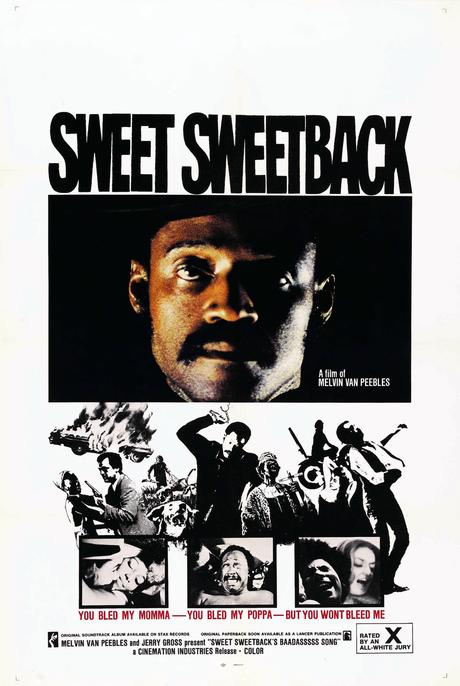
This week I decided to stray into the realm of avant-garde with "Sweet Sweetback's Baadassssss Song". It's said that this is the seminal blaxploitation film, so I naturally I was curious to check it out. Well, I'm sorry to report that I was wholly turned off by what it was trying to do.
What is the film trying to do? Well, that's a good question. After enduring this film for 97 minutes, I'm still unclear as to its intentions. From what I recall, there's a man named Sweetback (Melvin Van Peebles) who's good in bed and is a known badass. Due to his badassness, he gets into trouble with some racist cops (he attacks them after they beat up a black man), forcing him to go on the run. Throughout his great escape, he is aided by "the black community" (literally, the opening credits state "Starring: The Black Community"), positing the theory that all black people need to work together to fight "the Man". Certainly, there was some legitimacy to this claim during that era (the early 1970s), but the imagery this film focuses on created some insurmountable problems for me.
Within the opening minutes of the film, we are privy to a young boy (Sweetback) being forced to have sex with an older woman. He grows up to be a prostitute, engaging in exhibitionist sex in front of crowds of people. There's no reason for it, leaving me to assume that it's only there for the shock value. All throughout, it portrays black people in an unfavorable light, seemingly at odds with the message it claims to convey. When it's not depicting vulgar acts of public indecency, it's preoccupied with strange scenes like a heavyset man taking a dump. So on the one hand, it's employing a bold experimental filmmaking sensibility but conversely, it's also attempting to tell a linear story with a black power message. Unfortunately, the two styles don't mix.
In the end, it all comes across like the work of a filmmaker who's trying too hard. With its murky cinematography and muddled script, it feels more in line with a scrappy student film than a serious production. I give the director points for trying something different within the confines of conventional black cinema, but the finished product fails to be artistically or thematically engaging. For a film that supposedly speaks for the entire black community, I think we deserve better.
This film is part of my Black Cinema marathon.
